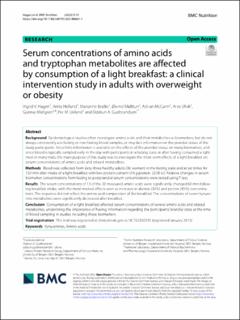| dc.contributor.author | Hagen, Ingrid Valheim | |
| dc.contributor.author | Helland, Anita | |
| dc.contributor.author | Bratlie, Marianne | |
| dc.contributor.author | Midttun, Bjørn Øivind | |
| dc.contributor.author | McCann, Adrian | |
| dc.contributor.author | Ulvik, Arve | |
| dc.contributor.author | Mellgren, Gunnar | |
| dc.contributor.author | Ueland, Per Magne | |
| dc.contributor.author | Gudbrandsen, Oddrun Anita | |
| dc.date.accessioned | 2023-07-13T06:51:01Z | |
| dc.date.available | 2023-07-13T06:51:01Z | |
| dc.date.created | 2023-03-30T14:44:38Z | |
| dc.date.issued | 2023 | |
| dc.identifier.issn | 2055-0928 | |
| dc.identifier.uri | https://hdl.handle.net/11250/3078511 | |
| dc.description.abstract | Background
Epidemiological studies often investigate amino acids and their metabolites as biomarkers, but do not always consistently use fasting or non-fasting blood samples, or may lack information on the prandial status of the study participants. Since little information is available on the effects of the prandial status on many biomarkers, and since blood is typically sampled early in the day with participants in a fasting state or after having consumed a light meal in many trials, the main purpose of this study was to investigate the short-term effects of a light breakfast on serum concentrations of amino acids and related metabolites.
Methods
Blood was collected from sixty-three healthy adults (36 women) in the fasting state and at set times for 120 min after intake of a light breakfast with low protein content (14 g protein, 2218 kJ). Relative changes in serum biomarker concentrations from fasting to postprandial serum concentrations were tested using T test.
Results
The serum concentrations of 13 of the 20 measured amino acids were significantly changed 60 min following breakfast intake, with the most marked effects seen as increases in alanine (34%) and proline (45%) concentrations. The response did not reflect the amino acid composition of the breakfast. The concentrations of seven kynurenine metabolites were significantly decreased after breakfast.
Conclusion
Consumption of a light breakfast affected serum concentrations of several amino acids and related metabolites, underlining the importance of having information regarding the participants’ prandial state at the time of blood sampling in studies including these biomarkers. | en_US |
| dc.language.iso | eng | en_US |
| dc.publisher | BMC | en_US |
| dc.rights | Navngivelse 4.0 Internasjonal | * |
| dc.rights.uri | http://creativecommons.org/licenses/by/4.0/deed.no | * |
| dc.title | Serum concentrations of amino acids and tryptophan metabolites are affected by consumption of a light breakfast: a clinical intervention study in adults with overweight or obesity | en_US |
| dc.type | Journal article | en_US |
| dc.type | Peer reviewed | en_US |
| dc.description.version | publishedVersion | en_US |
| dc.rights.holder | Copyright The Author(s) 2023 | en_US |
| dc.source.articlenumber | 10 | en_US |
| cristin.ispublished | true | |
| cristin.fulltext | original | |
| cristin.qualitycode | 1 | |
| dc.identifier.doi | 10.1186/s40795-022-00661-1 | |
| dc.identifier.cristin | 2138578 | |
| dc.source.journal | BMC Nutrition | en_US |
| dc.identifier.citation | BMC Nutrition. 2023, 9, 10. | en_US |
| dc.source.volume | 9 | en_US |

